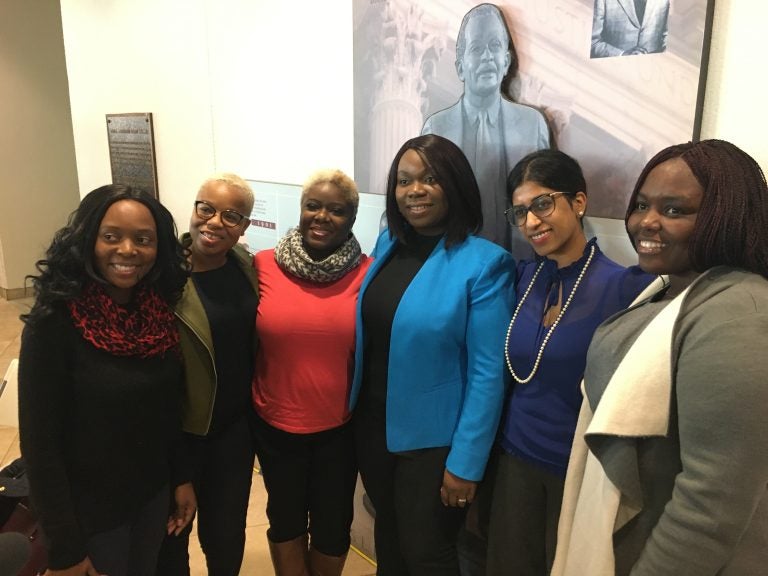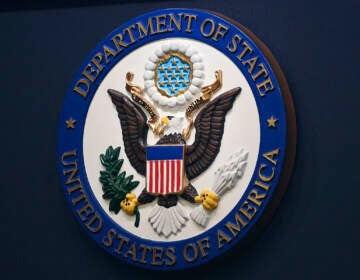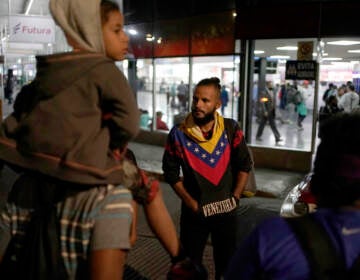Delaware leaders pledge their openness to refugees, asylum-seekers
Refugees and asylum-seekers are welcome in Delaware. That's the message state leaders sent to the White House in response to an executive order.

Former refugees joined advocates at the signing ceremony. From left, Sophie Marie Namugenyi, director of support services at Jewish Family Services; Saybah Wolokolie; Ajawavi J. Ajavon; Lourena Gboeah, refugee from Liberia; Padmaja Charya, refugee therapist with JFS; and Jenevive Newman, JFS refugee case manager. (Mark Eichmann/WHYY)
Refugees and asylum-seekers are welcome in Delaware.
That’s the message state leaders sent to the White House Thursday in response to a presidential executive order earlier this fall that required states to “opt-in” to a program that resettles refugees.
“We’re here today to stand up to a president who turns away refugees, who scapegoats immigrants and governs with selfish cowardice instead of compassion,” said New Castle County executive Matt Meyer. “Not only will we house them, we will welcome them. And we will welcome them because refugees make us stronger.”
Meyer joined Wilmington Mayor Mike Purzycki at a ceremony Thursday morning to sign letters to Secretary of State Mike Pompeo in response to Executive Order 13888. That order, signed by President Trump in September, required states to consent to take part in refugee resettlement program.
“What a pity that we have to go through this exercise,” Purzycki said. “To say ‘yes,’ as if we were an exception. We want immigrants in this city.”
Gov. John Carney also sent a letter opting the state into the refugee program. “Our country has historically been a refuge of safe harbor for those fleeing war-torn countries, violence and political persecution,” Carney wrote. “We should continue to stand as a beacon of hope and freedom for people around the world.”
Lourena Gboeah came to the U.S. as a refugee from Liberia when she was four years old. Now, she has a master’s degree and is working full time as a social worker. She wants others like her to have the same opportunity to succeed.
“When I look at my life and experiences, I know that there’s so many others who, if they had the opportunity, they would probably do the same thing,” Gboeah said.
She calls the decision to require states to opt-in to the resettlement program painful.
“The crisis continues to grow, but then the response is like fading away,” she said.
Between 2017 and 2019, Delaware welcomed 95 refugees. That’s according to Jewish Family Services which helps the refugees settle in the First State.
“While Jewish is in our name, we serve everyone,” said JFS CEO Basha Silverman. “We do this because we are compelled to welcome the stranger. We have been resettling refugees and serving immigrants for 100 years.”
Even though Delaware is a small state, there’s room for more than 95 refugees, said Sophie Marie Namugenyi, director of youth and family support at Jewish Family Services, which includes the refugee program.
“A lot of refugees, asylum-seekers who are in the state, are not able to come forward or not able to go to the state services to receive benefits because of the fear and the stigma that is going on right now,” she said.
Refugees resettled in Delaware come from across the globe. JFS has helped resettle families in Delaware from Afghanistan, Pakistan and the Democratic Republic of Congo.
Namugenyi said the letters of support from local and state government is a big step toward making refugees feel more welcomed in the state.
“When they hear that the legislators, the public officials are for refugees, are for their families, are welcomed in the community … it’s a step forward,” she said.
Last month, refugee advocates filed a lawsuit in Maryland, calling the executive order a violation of the Refugee Act. That act, signed by President Jimmy Carter in 1980, established procedures on how refugees were settled in the U.S. The suit says the resettlement of refugees has never “been contingent on the prior written consent of government officials in the jurisdiction where the refugee is to be resettled.”
In his letter to Pompeo, Gov. Carney makes it clear that his decision to opt-in to refugee settlement is not an endorsement of the executive order’s legality, especially in light of the federal lawsuit in Maryland.
WHYY is your source for fact-based, in-depth journalism and information. As a nonprofit organization, we rely on financial support from readers like you. Please give today.





